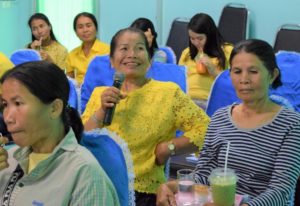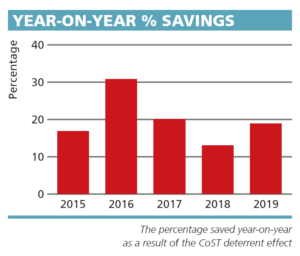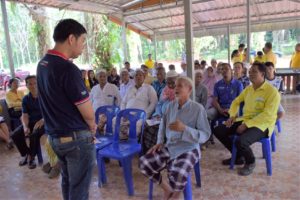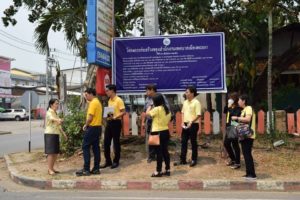 CoST – the Infrastructure Transparency Initiative (CoST) is the leading global initiative working to improving infrastructure transparency, accountability and participation. Promoting open data, data validation and use, multi-stakeholder working and civic engagement, CoST has seen its impact felt in different ways. This story explains how in Thailand – supported by the UNDP and the UK Prosperity Fund ASEAN Economic Reform Programme – the CoST approach prompted behavioural change from the private sector, community and government and led to cost savings of THB 11.5 billion (US $360 million)*.
CoST – the Infrastructure Transparency Initiative (CoST) is the leading global initiative working to improving infrastructure transparency, accountability and participation. Promoting open data, data validation and use, multi-stakeholder working and civic engagement, CoST has seen its impact felt in different ways. This story explains how in Thailand – supported by the UNDP and the UK Prosperity Fund ASEAN Economic Reform Programme – the CoST approach prompted behavioural change from the private sector, community and government and led to cost savings of THB 11.5 billion (US $360 million)*.
Story highlights:
- Greater infrastructure transparency sent a strong message to procuring entities, encouraging competitive bidding and lower contract prices.
- Enhanced public participation raised the voice of local communities and improved trust between citizens and decision-makers.
- Improved relations had a tangible positive impact on project delivery, such as the adoption of critical health and safety measures at construction sites.
- These changes took place in a challenging context, where opportunities for citizen participation in decision making are typically limited.
CoST approach contributes to cost savings of US $360 million
The CoST approach includes core features of data disclosure, data validation, multi-stakeholder working and social accountability. Working together, these features limit corruption, inefficiency and mismanagement across the project cycle and improve outcomes from infrastructure investment, helping to achieve stronger economies and better lives.
In 2020 the Thai Ministry of Finance confirmed a cost saving of US $360 million as a result of the deterrent effect of the CoST approach. This follows several previous  public statements made by the government and follows increased transparency on infrastructure projects which inhibited misbehaviour in procurement and strengthened bidding competition. This led to lower contract prices and a more efficient use of the public budget.
public statements made by the government and follows increased transparency on infrastructure projects which inhibited misbehaviour in procurement and strengthened bidding competition. This led to lower contract prices and a more efficient use of the public budget.
Since 2015 CoST Thailand has been working to increase the level of data in the public domain by using the CoST Infrastructure Data Standard (CoST IDS). The CoST IDS promotes the publication of 40 data points across key stages of the infrastructure project cycle from identification and procurement through to implementation and completion. CoST Thailand’s success in increasing disclosed data is clear to see on its disclosure platform: just two projects were published in 2015, rising to 317 in March 2020.
With this increase in infrastructure transparency a strong signal has been sent to those involved in public procurement processes that proposals and the delivery of projects will be subject to greater scrutiny. Ultimately this encouraged bidders to present more cost-effective proposals, and the resulting savings can be reallocated to other critical infrastructure or public services.
Enabling participation in a civic space improves infrastructure design
The social accountability feature of CoST emphasises the role that the public and other stakeholders play in ensuring projects are delivered on time and to budget. While citizen participation was typically limited at the time CoST was introduced – soon after the military government assumed power – CoST Thailand has found opportunities for meaningful engagement.

Over the last two years CoST Thailand, which is hosted by the Comptroller General’s Department, has been bringing together local communities and the contractors and procuring entities of projects through public gatherings. Here a safe space has been provided for communities to raise issues on both how the construction process and poor-quality infrastructure has affected their everyday lives. This three-way dialogue is an innovative approach in Thailand but one with tangible results. From speeding up project delivery to tackling issues through improved design, it has changed how projects are carried out.
Fostering dialogue and building trust
The gatherings have been facilitated by the CoST Thailand assurance team which – as with every CoST programme – is appointed to carry out an independent validation of data disclosed on projects. In the public gathering setting, the assurance team acts as an impartial mediator to foster constructive dialogue and reduce conflict between the community and decision-makers. As stated by one member of the CoST Thailand assurance team:
“CoST set a standard for communication and dialogue with project owners and communities”
Raising critical water, sanitation and hygiene concerns
Pipes and drainage systems can be particularly vulnerable to disruption from roadworks, and such issues have been raised – and resolved – many times during CoST Thailand’s public gatherings. Examples of this include where:
- A water pipe had been relocated and led to local water shortages for two weeks.
- The procuring entity of the project agreed to install temporary pipes to resolve the issue after hearing about its impact on residents first-hand.
- Complaints were raised over the design of a highway that was under construction, which would have increased the risk of flooding for the residents living nearby. To rectify this, the procuring entity of the project agreed to undertake a review of the drainage network.
- Families gained access to the local area’s main drainage systems after they requested access as part of ongoing works. The procuring entity agreed to connect each household to the drainage system on request.
Ensuring sites are safe and hazard free
Health and safety is another common issue raised at gatherings. In one instance, street lighting was installed along roadworks conducted near a school after residents highlighted the obvious risks that were posed by poor visibility.
Similar measures have also been taken to improve safety on roads, such as installing barriers around sites and displaying new traffic routes when diversions occur. In a country with one of the highest road-traffic mortality rates in the world – the second highest per capita according to the World Health Organization – such measures are vital to avoiding deadly, but otherwise preventable, road accidents.
Participation leads to mindset change and greater collaboration

“[It was common practice to] wake up with a construction hole in front of your home’’ – described by a community leader at a 2019 public forum.
Not only have the public sessions resolved harmful project issues, but procuring entities, now equipped with a greater appreciation of poor project delivery on real lives, recognise the value of community voices during the construction process. CoST Thailand has reported a reduction in disputes between stakeholders and a more efficient approach to infrastructure delivery.
Demonstrable examples of this include:
- In Bor Win industrial estate in Chonburi province, where a contractor from a flyover project directly associated an improved working environment with accelerated project completion.
- Better communication on projects: where previously information on public display boards has been generic and confusing, much clearer and relevant messaging has been provided.
- New processes adopted to inform communities of ongoing construction work, particularly if they adversely impact accessibility and transport routes. One contractor for example developed a schedule for traffic disruption which was agreed by the community, reducing the likelihood of delaying citizens on their way to work or school.
Although embryonic, this is a positive sign of a shift in mindset in government towards greater social accountability and open information. This is clearly shown in changes to procurement law in 2019, which now requires data from projects included in the CoST programme to be disclosed in line with the CoST IDS. Scaling up CoST Thailand’s reach across the country will augment this positive change and introduce new standards in project communication across the sector.
When Thailand joined CoST in 2015, the country was led by a military government. Within this context, CoST Thailand’s public forums are a significant step towards greater dialogue between communities and decision-makers. Furthermore, CoST is generating a set of transferable skills in public participation which have the potential to spark similar local approaches, and have created a space for transparency, accountability and participation.
Our work in Thailand has been made possible with the support from the UNDP, the UK Prosperity Fund ASEAN Economic Reform Programme and the Thailand Ministry of Finance.
* This figure is correct as of July 2020.
Download the full CoST Thailand impact story here.